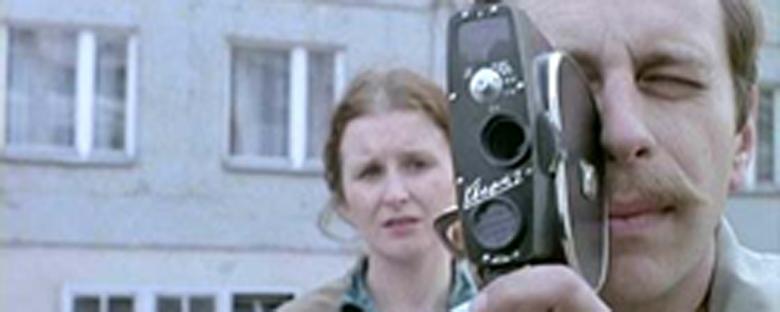Reviews
Amator
Krzysztof Kieslowski
Poland, 1979
Credits
Review by Leo Goldsmith
Posted on 08 September 2004
Source Kino Video DVD
Related articles
features: Kieslowski’s Trois Couleurs
reviews: The Big Animal
reviews: Blind Chance
reviews: No End
reviews: The Scar
“So, you film whatever presents itself?… It’s a great idea.” This is a succinct description of Filip Mosz’s earliest work as an amateur filmmaker in Camera Buff. Filip has purchased an 8mm movie camera to document his daughter’s birth, but this simple hobby becomes an obsession, even a duty, that threatens his stable, middle-class life.
Krzysztof Kieslowski began his film career as a documentarian, so it is fitting that his film-about-film concerns the responsibility of the filmmaker who wants simply to capture life. Filip’s earliest subjects are quotidian: the first days of his daughter’s life, his friend Piotr driving his hearse, the progress of the paving of the sidewalk across the street from his apartment. But Filip finds more complex subjects, and the aesthetic and social demands of his work increase with his development as a filmmaker.
From the first hints of his obsession, Filip’s wife, Irenka, is suspicious of the intensity of his interest in film. Assigned by his boss to film a company celebration, Filip flits around, attempting to capture every detail of the event. He is like the sparrow hawk in Irenka’s dream, descending on a group of chickens with an almost greedy, selfish dispassion. Filming his daughter as she almost falls out of her chair, Irenka asks: “If she fell off the balcony, would you film that too?” Filip is hungry for the minutiae of life, and in this appetite his wife recognizes a growing dissatisfaction with the serenity of their domestic life, a life that had once been so perfectly enviable.
In this conflict, Kieslowski posits the incompatibility of familial relations and a certain artistic temperament; or rather he illuminates the disastrous limitations of Filip’s aesthetics. The cinema offers Filip a privileged perspective on the hidden details of the world, a “gift of observation.” But Filip’s perspective is removed from the responsibilities of the very reality it attempts to represent. His film of the sidewalk paving is a typical example: shot from the vantage point of his balcony, the film maintains a distance, a non-involvement. But this remove characterizes even his cinematic representation of his wife walking away from him in disgust and anger at his consuming obsession. “I saw you walking away,” he tells her. “You looked so small. I will always see you like that.”
Filip’s artistic growth is a process of understanding the obligations of the filmmaker to those whom he documents. It is a gradual understanding of the alternately destructive and transforming power of his images. As one character rather glibly puts it, “filmmakers are service providers,” and despite the unromantic tone of such a designation, this seems to be very near to Kieslowski’s own view. As much as Filip strives to reveal the truth with his exposé documentaries and slice-of-life pieces of cinéma vérité, the reality of his own life remains hidden to him. It is only when he finally turns the camera on himself that his art becomes honest, self-reflexive, and complete.
The theme of social responsibility is an important one in Kieslowski’s career, from his earliest films through Dekalog and his Trois Couleurs trilogy. His subsequent films demonstrate the responsibility that each of us has to the rest of the world. Complete autonomy and independence are illusions, as Julie finds in her attempt at isolation in Bleu, or as Veronique discovers in her connection to a distant stranger in The Double Life of Veronique. Camera Buff is an exploration of the particular obligations of the filmmaker, and as such, it stands as Kieslowski’s credo.
We don’t do comments anymore, but you may contact us here or find us on Twitter or Facebook.



